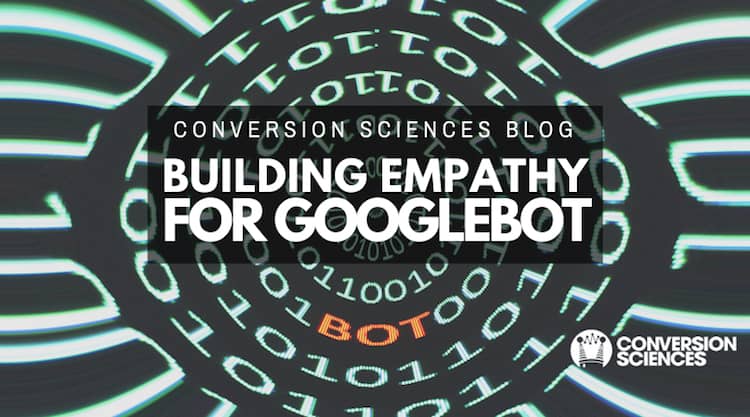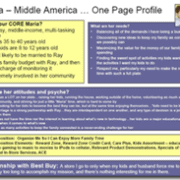Converting the Toughest Visitor of All: Googlebot
Every site has one visitor in common: Googlebot. Googlebot is an unusual visitor that few of us understand. Understand the persona profile of Googlebot and use it to your advantage.
If you follow The Conversion Scientist, you know that a failure to understand your visitor is conversion suicide.
So how do we get copywriters, designers, developers and marketers to configure their site for this powerful king-maker visitor? The same way we do this for our human visitors: We personify them.
Building Empathy For Googlebot
Personas are a challenging topic. Personas are, well, personal to every business. You can’t cheat off of anyone else’s paper when putting them together. Whether you’re going to spend 30 minutes dashing off what you know about your online visitors or invest in a full workup to hack your company’s intelligence, you have to do the work. You can’t borrow from someone else’s case study.
There is one exception, and this visitor may be on your site as you read this.
I’m going to use a persona to help you relate to Googlebot. All of the components are here.
Note: I’m sure those of you experienced in SEO could add to this persona. Please do so in the comments.
My Search Engine Land column “Building Empathy for Googlebot” this month is a persona profile of Googlebot, and any site should be able to use this to their advantage.
Put it somewhere everyone on the Web team can see it; print posters, put it up on Basecamp, add it to your war room.
It should go right next to your other personas. Don’t have any? Contact us and we’ll help you understand if personas will move your online business forward.
Here’s an excerpt:
Demographics
Name: Googlebot
Education: Ph.D. in Kindergarten
Gender: Male. Definitely male.
Description
While Googlebot is one of the most pervasive presences on the Internet, little is known about him. It is widely believed that he has an undiagnosed combination of savant syndrome and autistic disorder.
This condition is marked by super-human analytical powers combined with an inability to connect basic concepts or understand simple social norms. Googlebot does not have a sense of humor.
Another reason for this diagnosis is Googlebot’s amazing but selective memory. Googlebot has an unwavering fascination with words and an uncanny ability to remember the links that connect the Internet’s far flung pages.
It is widely believed that Googlebot is also good at counting large sums of money.
Googlebot can identify and recall a seemingly unlimited number of images and videos, but has no understanding of their meaning.
Mode Of Persuasion: Methodical
Googlebot analyzes information slowly and logically. Methodical visitors need lots of detailed information.
Visitor Commentary
These are Googlebot’s needs in his own words:
I’m an excellent surfer. I come to your site on Tuesday… definitely Tuesday afternoon. I read your pages. I see your words. That tells me everything about you. You use some words over and over and I can tell what you talk about. Of course there are the meta tags. Descriptions, descriptions are good; and the page title. Headings have words and I like to count the words in headings and see if they are in other places on your site too.
Links. I like links, definitely. Link text has words and I like to compare them, compare them to the other words in the other places. The link text words tell me about the place they link to. Must … resist … urge … to … follow … until … done … here.
Of course, you have links back to your site, 497 links — definitely 497 – and the words on those links – they call it anchor text, but anchors are on ships and ships float on water and I don’t see many sites about ships and water — and I can compare those link words to the words in the other places on your site.
I’m an excellent surfer, you know.
Uh-oh. Your site doesn’t change much. 99.93% of text is the same as last time I visited, 99.93%, definitely 99.93.
Uh-oh. Images. Video. Strange blobs of pixels. Of course, I can’t see them, but sometimes they have words, alt text words and then I know everything about them and I can compare those words to the other words on the site.
Sometimes people try to trick me with invisible text or wrong keywords meta tags or funny links from sites with very different words, and then I stop visiting and stop counting words and stop tracking links and then the site disappears since I don’t like lying liars.
Of course, I’m an excellent surfer.
Questions To Be Answered
What questions Googlebot is trying to answer on your site.
- Which pages to index (sitemap.xml)
- Which pages to skip (robots.txt)
- Primary domain (canonical info)
- Words that define each page site (title tag, description meta tag, keyword meta tag)
- Words that readers can see: Heading tags, body copy
- Words that readers cannot see: Image alt text and title text
- Links to other sites
- Links from other sites telling Googlebot what the site is about
Calls To Action
This is how we ask Googlebot to take action. For Googlebot, a “conversion” can be defined as getting a page on our site indexed in the Google database.
Sitemap.xml tells Googlebot which pages to index and how to prioritize them.
Internal links with keywords in the anchor text helps Googlebot find pages and associate words with those pages.
Recommended Strategies on Converting the Toughest Visitor of All
- Do not attempt to sell Googlebot anything or invite him to join your email list.
- Change content frequently. Googlebot loves blogs.
- Don’t attempt to contact Googlebot or Google support.
- Use video. Googlebot seems to like video, even though he can’t understand it.
- Create content that makes other sites link to you.
- Link to sites that have words similar to yours.
- Put transcripts of videos on the page.
Is All Of This Necessary?
While it may seem unnecessary to experienced SEOs to have a persona for Googlebot, think of the copywriters who must write for the site, but don’t have SEO experience. Think of the designers that may not understand the search implications of their media choices. Think of the executives who don’t understand why they should invest in SEO.
All of these people will gain a better understanding of Googlebot and the challenges we face when designing a site for him (or her).
Now think about the human visitors to the site. How would a few personas help everyone communicate with real people?
As it turns out, personas help a lot.
For more on user personas.
Originally published on Search Engine Land.













Hey Brian,
You’re absolutely right about making sure you understand the Google Bot. Fail to impress him (or her, lol) and you’re certainly not doing your site any favors in the SERPs. (experience being my teacher…)
Experience is the best and least forgiving teacher. Thanks for the comment.
Experience is the best and least forgiving teacher. Thanks for the comment.